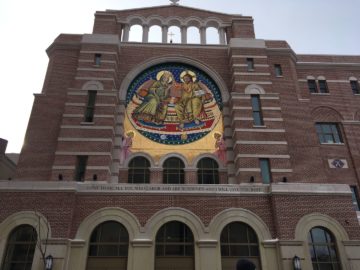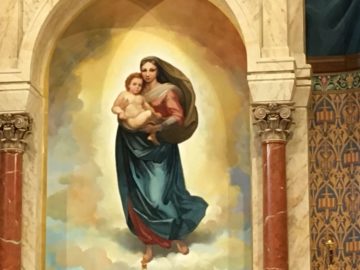Please find a Franciscan Gospel reflection and questions written by Fr. Paul Gallagher, OFM for your prayer during this coming Third Sunday of Ordinary Time. They are edited by Franciscan Sister of Christian Charity Sister Anne Marie Lom and Joe Thiel. The excerpts from the Sunday readings are prepared by Joe Thiel. To read or download the complete pdf with excerpts for your prayer, please click here: Franciscan Gospel Reflection January 26 2020. Excerpts are from the Lectionary for Mass for Use in the Dioceses of the United States of America, second typical edition © 2001, 1998, 1997, 1986, 1970 Confraternity of Christian Doctrine, Inc., Washington, DC. Used with permission. All rights reserved. No portion of this text may be reproduced by any means without permission in writing from the copyright owner. Photos: St. Paul’s University Catholic Center, Madison, Wisconsin
Matthew 4:12-23
When Jesus heard that John had been arrested, he withdrew to Galilee. He left Nazareth and went to live in Capernaum by the sea, in the region of Zebulun and Naphtali, so that what had been said through Isaiah the prophet might be fulfilled: “Land of Zebulun and land of Naphtali, the way to the sea, beyond the Jordan, Galilee of the Gentiles, the people who sit in darkness have seen a great light, on those dwelling in a land overshadowed by death light has arisen.” From that time on, Jesus began to preach and say, “Repent, for the kingdom of heaven is at hand.”
As he was walking by the Sea of Galilee, he saw two brothers, Simon who is called Peter, and his brother Andrew, casting a net into the sea; they were fishermen. He said to them, “Come after me, and I will make you fishers of men.” At once they left their nets and followed him. He walked along from there and saw two other brothers, James, the son of Zebedee, and his brother John. They were in a boat, with their father Zebedee, mending their nets. He called them, and immediately they left their boat and their father and followed him.
He went around all of Galilee, teaching in their synagogues, proclaiming the gospel of the kingdom, and curing every disease and illness among the people.
Background:
The arrest of John the Baptist brought to a close his ministry of preparing for the coming of the messiah. The gospels of Matthew, Mark, and Luke are in agreement, all three indicating that Jesus did not begin his ministry until John’s ministry had ended. The exception is John’s gospel, where Jesus and John are ministering concurrently. Some scholars believe that Jesus may have even been a disciple of John in the very early part of his ministry. He, like John, would have called people to repentance and baptism as a sign of their conversion. But as Jesus’ ministry unfolded, he discovered God’s grace for healing, and it became more of a focus of his own ministry. His understanding of himself and his mission also evolved, from announcing the future coming of the reign of God to declaration of the reign of God being established now in their midst. The gospels do not give a clear understanding of how Jesus came to his own awareness of his ministry.
While John’s gospel is distinct in describing Jesus beginning his ministry while John the Baptist is still alive, Matthew is unique in his use of quotes from the Hebrew Scriptures to explain events in Jesus’ life. The beginning of the gospel text for today states that Jesus moved from his home at Nazareth to the fishing community of Capernaum. Capernaum was on the major trade routes. The location provided a variety of people for Jesus to engage with his message of repentance and his healing ministry. But the fact that Capernaum was within the Gentile territory could have been a source of scandal too. By quoting the great prophet Isaiah, Matthew suggests that this move is not a scandal, but rather Jesus obeying the will of God, whose concern extends to the ends of the earth.
Followers of rabbis normally presented themselves for training. Contrary to this tradition, Jesus called his disciples. During the dry season, when farmers were waiting for the harvest, the work was left to servants. Traditionally, this was the time when men gathered to debate and to “be seen.” It was the time when one who wished to promote a cause or had a grievance would gather followers. It was assumed that in time those followers would return to their normal daily lives. The pairs of brothers, Peter and Andrew and James and John, are described as fishermen, one of the most successful and stable family businesses of the day. They are presented as leaving the business, their position in the community, and, in the case of James and John, even their father, to become followers of Jesus.
Reflection Questions:
1. Looking back on your life, have moving, taking a new job, or undertaking some physical change ever been a sign of a change taking place within you on a deeper level?
2. Are you a person who greets new challenges with enthusiasm, or one who likes to weigh options and consider possibilities carefully? How might your style affect how you are hearing Jesus’ call of his first disciples? How might this be influencing your ability to hear God speaking to you in this gospel text today?
3. What are some of the things that may have gone through Jesus’ thoughts as he heard of the arrest of John the Baptist?
4. What does Jesus seem to be saying by moving to the region of Zebulun and Naphtali?
5. Have there been times when you believed God was inviting you to make some kind of change in your life? How did you experience that invitation?
6. Imagine for a moment that you are among those cleaning nets that morning with James, John, Andrew and Peter, and you see and hear Jesus approach them and ask them “Come after me, and I will make you fishers of men.” What thoughts and feeling arise within you? What do you want to say? Do you speak those words?
7. The disciples here are portrayed as leaving behind their former life to become disciples. What have you left behind in your effort to be Jesus’ disciple?
8. Can you talk with God now about whatever struck you most deeply in this gospel, your own struggle to hear God call you, or perhaps your own awareness of how you have been a faithful disciple?




